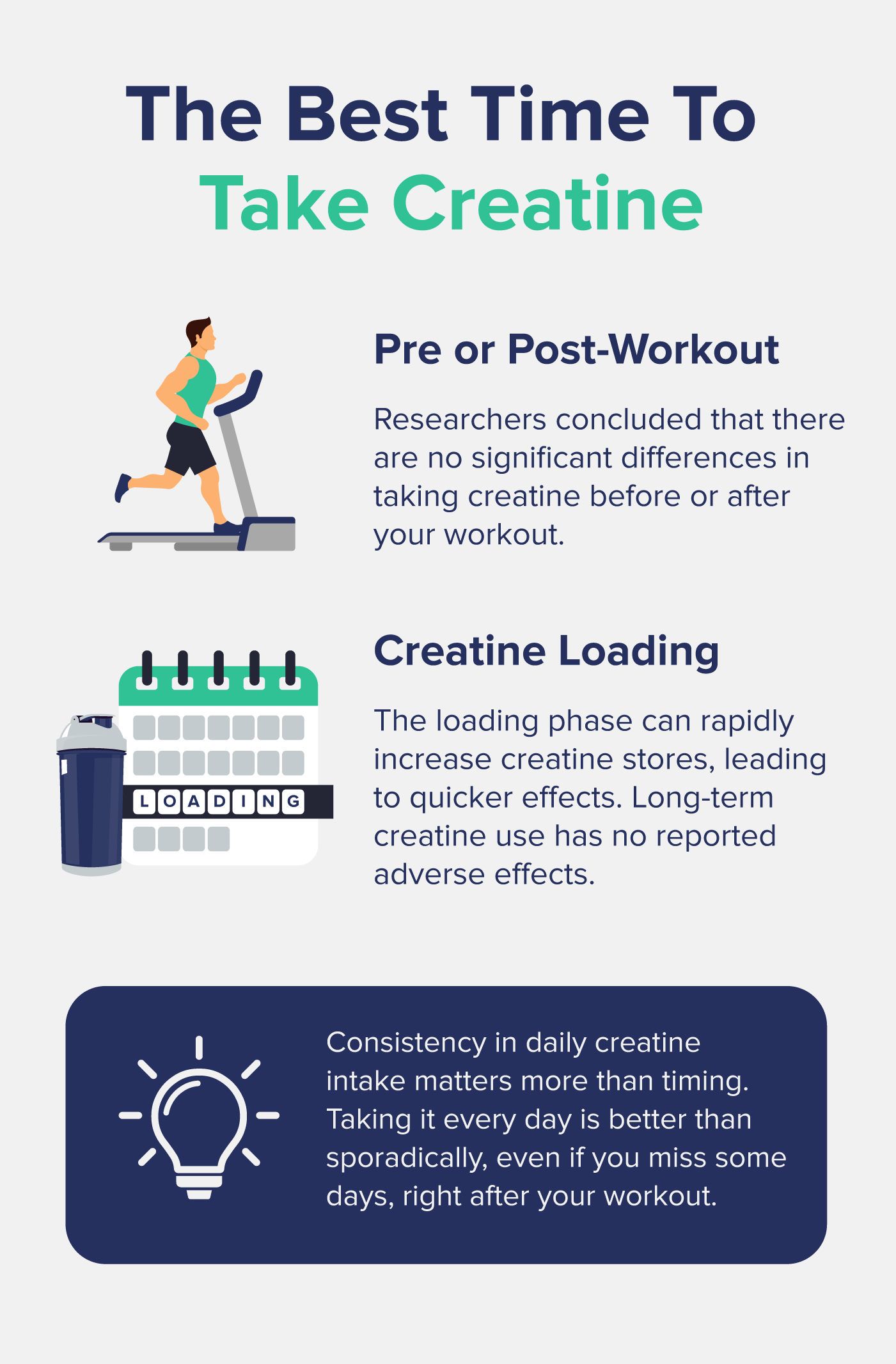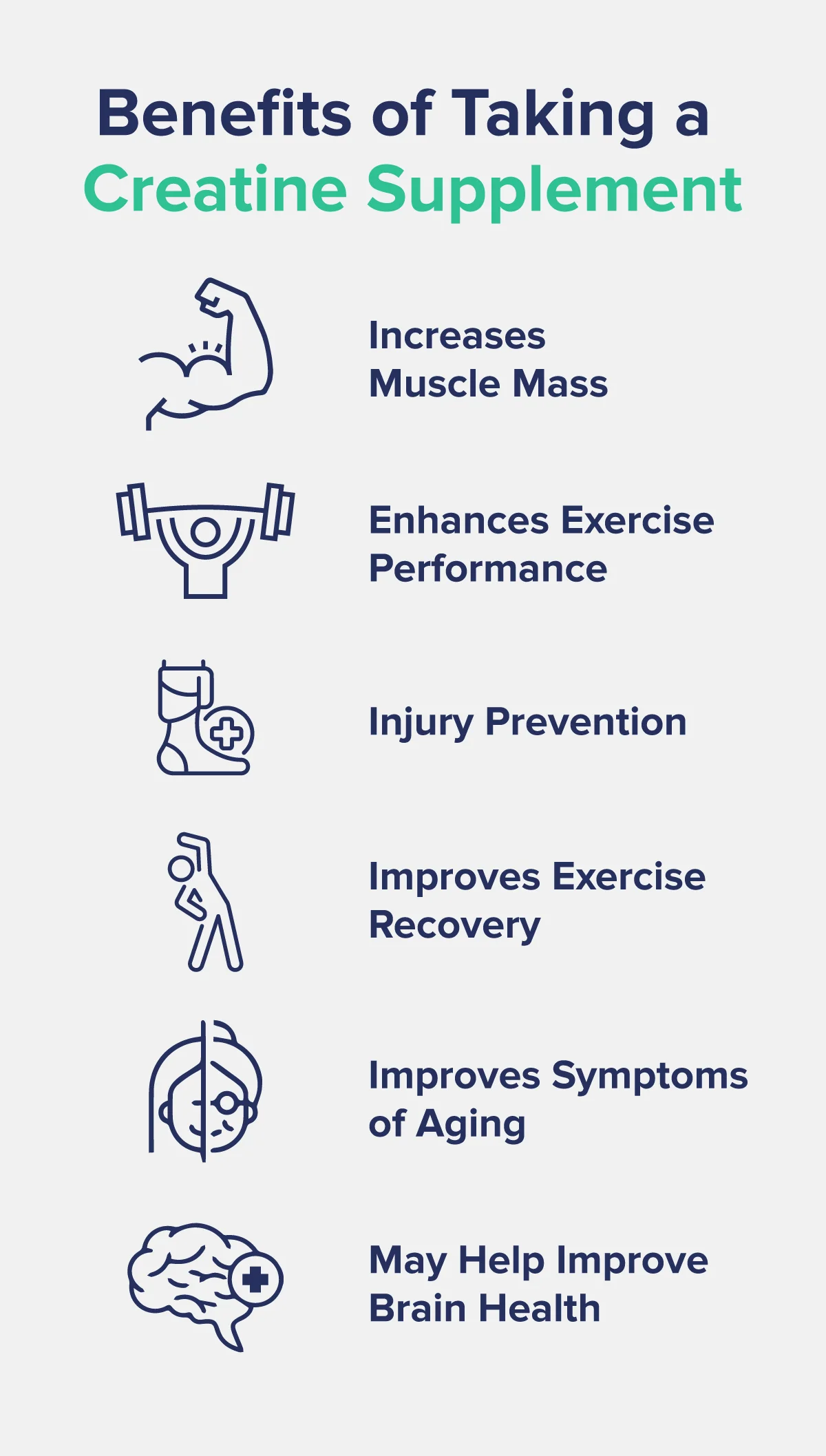Try our favorite, clean protein powder: See our top pick →
Try our favorite, clean protein powder: See our top pick →
This post contains links through which we may earn a small commission should you make a purchase from a brand. This in no way affects our ability to objectively critique the products and brands we review.
Evidence Based Research To fulfill our commitment to bringing our audience accurate and insightful content, our expert writers and medical reviewers rely on carefully curated research.
Read Our Editorial Policy
With so many useless dietary supplements on the market and misleading claims about diet, exercise, and nutrition out there, it can seem hard to believe that there’s even one good product worth taking.
Well, we’re here to tell you that creatine is that supplement.
Creatine is one of the most thoroughly studied supplements in the sports medicine world and has oodles of evidence demonstrating its effectiveness.
Mainly, taking creatine can enhance exercise performance and increase muscle mass when combined with resistance training and a balanced high-protein diet.
However, with the rise in interest in strength training in the last decade, there are increasing questions about supplement timing.
Per The International Society of Sports Nutrition, there is evidence that nutrient timing does impact muscle protein synthesis and athletic performance.
So what about creatine? When exactly is the best time to take creatine in your daily routine?
If you want the TL;DR: more research is needed, but––if you’re taking a maintenance dose of creatine––the time of day you take it, whether it’s a rest day or a workout day, doesn’t matter that much as long as you are taking it consistently. However, if you’re creatine loading, you should take each 5g dose spread throughout the day.
Taking creatine is one of the best ways to enhance your athletic performance and increase your lean mass (i.e., build more muscle).
While we do know there are benefits to consuming carbohydrates at a particular time, can the same be said for creatine? Unfortunately, the research on the optimal timing for creatine supplementation is limited. Regardless, here’s what we currently know.

If you are currently on a creatine supplementation regimen, there is one study that suggests there may be benefits to taking your creatine post-workout on training days.
In this study, 19 male recreational bodybuilders were split into two groups, with one group taking 5g of creatine immediately before the workout session and the other taking the same dose immediately after training sessions.
The results showed there was a slightly more positive correlation for the group taking creatine immediately post-workout when it came to body composition and strength.
Then again, another study––similar in size (n=22) but slightly different in scope (healthy older adults, both male and female)––found there was no difference between pre- and post-workout supplementation.
In a review of the currently available studies, researchers concluded that there are no significant differences in taking creatine before or after your workout.
This conclusion is partially due to the limited number of research studies on the topic of creatine timing, the small size of these studies (i.e., the number of participants), and the limited scope (only testing in combination with resistance training and no placebo groups).
The data is also contradictory due to the differences in dosages, sample sizes, and groups (trained vs untrained).With that being said, some research suggests that timing your creatine intake alongside carbohydrate and protein consumption closer to your training session may improve intramuscular creatine, lean mass growth, muscle fiber growth, and exercise performance.
While there are no official recommended doses for creatine, there are two recommended dosing strategies.
The simplest way is just to start taking a maintenance dose. This is a daily dose of 5g per day (or 0.1g of creatine per kg of body weight) for however long you wish to take creatine, from months to years.
(Side note: there are no adverse effects from taking creatine for long periods.)
The other dosing strategy is called creatine loading or the “loading phase.”
With this strategy, you will start with a week-long loading phase of 20g a day (or 0.2g of creatine per kg of body weight).
This is split into 5g doses taken four times a day to prevent digestive issues that can occur when taking high doses of creatine.
This loading phase proceeds for five to seven days and is then followed by the typical maintenance dose of 5g a day.

Current research indicates that following a loading phase protocol can increase the body’s creatine stores more quickly.
This increased creatine intake can lead to the supplement taking effect more rapidly than if you were to start with lower maintenance doses.
The evidence we do have about creatine timing shows there is little to no difference in the timing pre- or post-workout, with a slight preference towards post-workout supplementation.
More important than the timing is the consistency with which you take it; taking creatine every day, no matter the time, will always be more optimal than taking it sporadically (missing days here and there) immediately after your workout.
The only time you should be concerned about timing is if you are following a loading protocol.
Even then, if you’re not an athlete who needs rapid results, you can avoid any timing concerns by just starting with a maintenance dose protocol.
Now that you know all about creatine timing, you might be curious about the benefits of this supplement.
Did you know creatine isn’t just for growing big muscles and increasing performance? Yup. It may also improve brain health and prevent age-related declines in both brain function and muscle mass!
Here are all the benefits of creatine that science has been able to discover so far.
Creatine is a proven and safe supplement to help build muscle, particularly in healthy young individuals.
Creatine replenishes ATP (adenosine triphosphate), the energy currency of our cells, leading to improved sports performance, especially with high-intensity exercise. This results in improved strength and power output, as demonstrated by studies on elite athletes, including elite Brazilian soccer players.
Studies suggest that regular creatine use may reduce the risk of sports-related injuries, including cramping, dehydration, muscle tightness, strains, and various contact and non-contact injuries, particularly in college football players.
Creatine accelerates exercise recovery by promoting cell repair and growth, preserving lean tissue mass, and preventing the breakdown of muscle protein. It proves beneficial during immobilization due to injury or age-related decline.
Creatine exhibits potential in preventing sarcopenia and dynapenia, preserving and increasing muscle mass and strength in aging individuals. It also enhances bone mineral density and reduces the risk of falls, addressing various aspects of age-related decline.
In addition to physical benefits, creatine positively influences brain function and cognitive processing. It aids recovery from trauma, such as traumatic brain injury, by meeting the energy demands of brain cells. Long-term supplementation is essential for noticeable impacts on brain health.
Creatine is a very heavily studied compound. There are very few studies that demonstrate there are health problems associated with prolonged (six months or longer) creatine supplementation.
With that said, individuals who suffer from pre-existing kidney disease should avoid creatine since it can affect kidney function.
Those with liver disease or high blood pressure are also advised not to take creatine.
If you have any concerns about taking creatine due to an existing illness, consult your primary care physician.
For a maintenance dose, take 5g of creatine per day consistently. If you choose to load creatine, start with a week-long phase of 20g per day, split into 5g doses four times daily, followed by a maintenance dose of 5g per day.
Research on creatine timing is limited and contradictory. Some studies suggest no significant difference in taking creatine before or after a workout. However, there is a study indicating slightly better results when taken post-workout. Overall, taking a consistent maintenance dose is crucial, and more research is needed to determine optimal timing.
The time of day you take creatine, whether on a rest day or workout day, may not matter significantly if you’re on a maintenance dose. If you’re following a creatine loading protocol, spread your four 5g doses throughout the day to reach the 20g daily dose. Limited research suggests potential benefits when timing creatine intake alongside carbohydrates and protein close to training sessions.
Subscribe now and never miss anything about the topics important to you and your health.